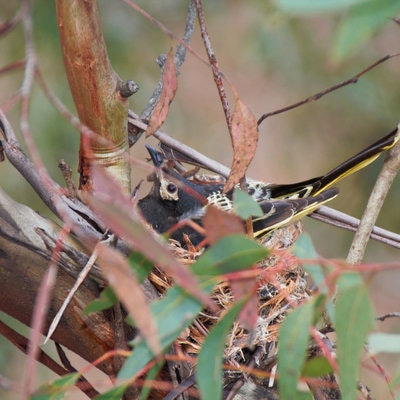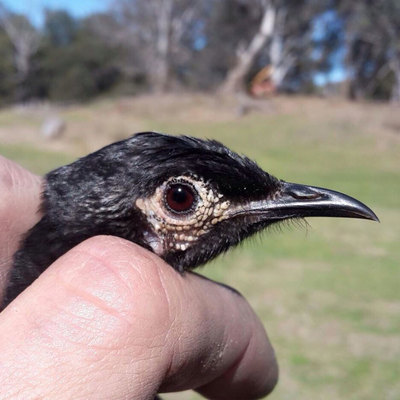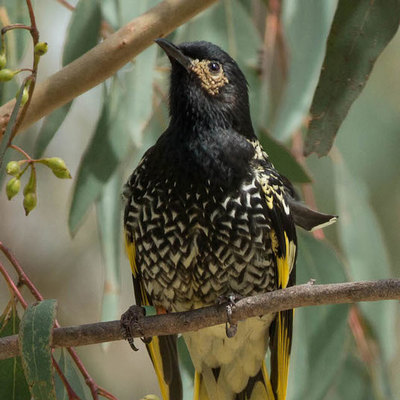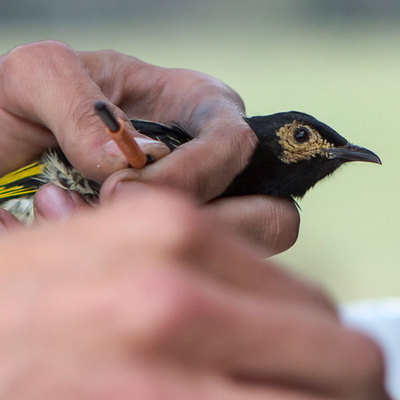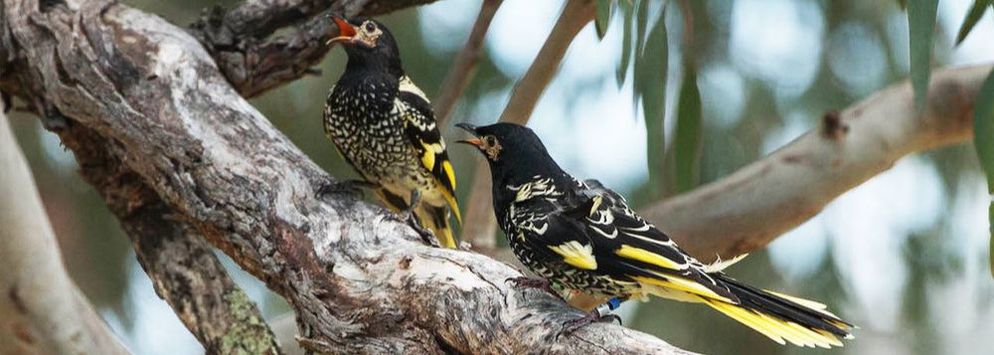Post graduating Soon after completing an ecology degree I was extremely fortunate to land a job as a Research Assistant at the Edward Grey Institute of Field Ornithology at the University of Oxford. My role was to conduct fieldwork and manage data for a major research project looking at the social ecology of wild birds (great tits) using novel tracking technologies. I loved my role within the project and learned a huge amount; not only with regard to evolutionary ecology, but also about how to select a research project for a PhD. I worked alongside a number of immensely talented and dedicated colleagues, which showed me what it takes to excel at a PhD. Par for the course as an RA is to subsequently pursue your own PhD research within the project you worked in. Not just because of the experience I had gained, but because tits are a model species for evolutionary biology. However, I opted for a rather different path: An ‘unstudyable species’ with the Difficult Bird Research Group. Turning down tits There are a few reasons why I opted not to pursue postgraduate study on tits. Having worked on the project intensively for 3 ½ years, I was uncertain that I could commit straight away to another 3 years of fieldwork with the same degree of passion that I had instilled in the work as an RA. Second, great tits are but one of 10,000 bird species. It is amazing that so much can be learned from tits as model species, but a large proportion of avifauna is basically unknown as many edge closer and closer towards extinction. Third, I feared I would not be good enough to do a PhD on this subject (specifically, learning to code is a major weakness of mine!). Finally, Oxford is just one of many awesome cities in the world, and I was unsure if I wanted to spend almost all of my twenties there. Happening upon regent honeyeaters I returned to Australia to volunteer for a research project with Dr Naomi Langmore studying the coevolution of cuckoos and their hosts. After spending a year of my undergrad degree in Australia, I had long possessed a desire to return. Australia is an awe-inspiring continent full of amazing wildlife. Its immense scale and unique ecology fascinated me. Plus, having worked on fairy-wrens for my undergraduate thesis, the opportunity to return to this species (this time as a host for cuckoos) was too good to miss. It was at a BBQ that Professor Rob Heinsohn told me of a potential project available on regent honeyeaters. The details were vague: ‘we have some money to research regent honeyeaters.’ That was about it! Such minimal details are probably not what the typical student wants to hear before devoting 3 ½ years to something. Somehow, the opportunity to work on a critically endangered species, alone in the vastness of Australia’s woodlands, with no research scope appealed to me. There are three reasons why: 1) to hopefully to make a difference to the plight of the species; 2) to work in and learn more about the ecology of Australia; and 3) because there was no expectation to achieve anything for this species. The broad consensus was that regent honeyeaters are too hard to study. “There are too few left”, “you won’t find enough for a PhD” were among the comments received before embarking on our research. Such comments meant I spent a lot of time in the first 6 months thinking about chapters that wouldn’t depend on me finding regent honeyeaters. In some ways, it also removed pressure and provided opportunity for us to turn consensus on its head. In August 2015, I ventured into the Blue Mountains with a tent and binoculars to see what I could find. Two years down the line, we have achieved a lot for the species. We have developed a novel strategy to monitor regent honeyeaters throughout their vast range. We found breeding aggregations hundreds of kilometres apart. We have shown that nest survival has declined dramatically since the 1990s, and that the population is suffering from a severe male bias to the sex ratio. We have one paper in press, two submitted and are developing innovative strategies to try to prevent the extinction of the species. We have genetic samples from 53 individuals which, in combination with ancient DNA from museum skins, will provide ample data for an exciting population genomics study. In terms of the PhD, the end is in sight. I have had to accept that most of my research is unlikely to be published in high-impact journals. It is not ground-breaking science, but it is science that is fundamental to the conservation of the species and highlights just how little we know about most threatened species. Given the ‘publish or perish (and get cited)’ dogma, I hope the path I have taken will not affect my future opportunities – we shall see! Ultimately, given shameful lack of investment in conservation by the Australian government, obtaining a career in research is not my primary motivation. Rather, my motivation is to complete a PhD to the best of my ability, to do everything I can to save regent honeyeaters from extinction, and produce good science on ‘difficult’ species in the process. Hopefully, focussing in this way might lead to a research position in the long term. Looking back, I am thankful I followed my heart to this PhD. It has been hard, but not as hard as I though it would be. I ponder opportunities I might have missed by opting for conservation over evolutionary biology. In reality, I have not left evolutionary biology at all. I still maintain collaborations with colleagues in Europe. There is also a hell of a lot that conservation biology can learn from evolutionary biology, and I relish trying to reconcile the two fields. For instance, I am studying the flowering phenology of regent honeyeater food trees, and its effect on nest timing. These ideas were adapted from two studies on great tits (here and here) but could have implications for how we conserve regent honeyeaters. We could account for phenological mismatch (food shortages) during nesting by providing novel food resources. Alternatively, we could selectively-feed regent honeyeaters to reduce the negative fitness effects of competitive exclusion by competitors. I am reviewing how undetected Allee effects could be accounted for in how we approach regent honeyeater conservation: an interest which stemmed directly from my previous work. Evolutionary biology (i.e. great tit social networks) could also help improve reintroduction biology of threatened species like the regent honeyeater, through experiments that increase our understanding of the social implications of translocating individuals. Given small sample sizes and monitoring constraints, capacity to gain this knowledge directly from threatened species is limited. Some things to consider when choosing to undertake a PhD and deciding on a field of research / study organism (in order of importance): Mental health: Coping with potential anxiety/depression should be at the front of any student’s mind. Studying species that are on the brink of extinction, in environments that have been severely degraded, is heartbreaking. I often have low periods when I realise there is a very real chance that I will outlive the wild regent honeyeater population. It is important to focus on the positives and to develop coping strategies. For me, being by the ocean, regular exercise, a friendship group outside of academia and visits to wild places keep me functioning. Supervisors: I am extremely grateful that I have an amazing group of supervisors. They are encouraging, understanding and immensely helpful, but they have also given me free reign to develop questions myself (initially terrifying but ultimately satisfying). They have put no pressure on me to publish, and I genuinely feel I could consider my supervisors as friends. Investing time to get to know potential supervisors is a wise move. Personality: Be nice! Completing a PhD requires help from many people. Annoying them will be detrimental. Purpose: Choose a PhD field of research that inspires and excites you. Don’t do a PhD to publish high impact papers and get a career in academia. I hope that my work will open doors to postdoctoral opportunities, but the reality is that conservation is as much politics as it is science: conserving species is not achieved solely in academic institutions. Admin: Developing a new study system for a PhD is extremely rewarding, but comes as the cost of time. I have spent many hours obtaining ethics permits, scientific licences, permission to access private property etc. Be prepared for this if you’re not joining an established system. Good luck! Ross ☺
2 Comments
|
|



